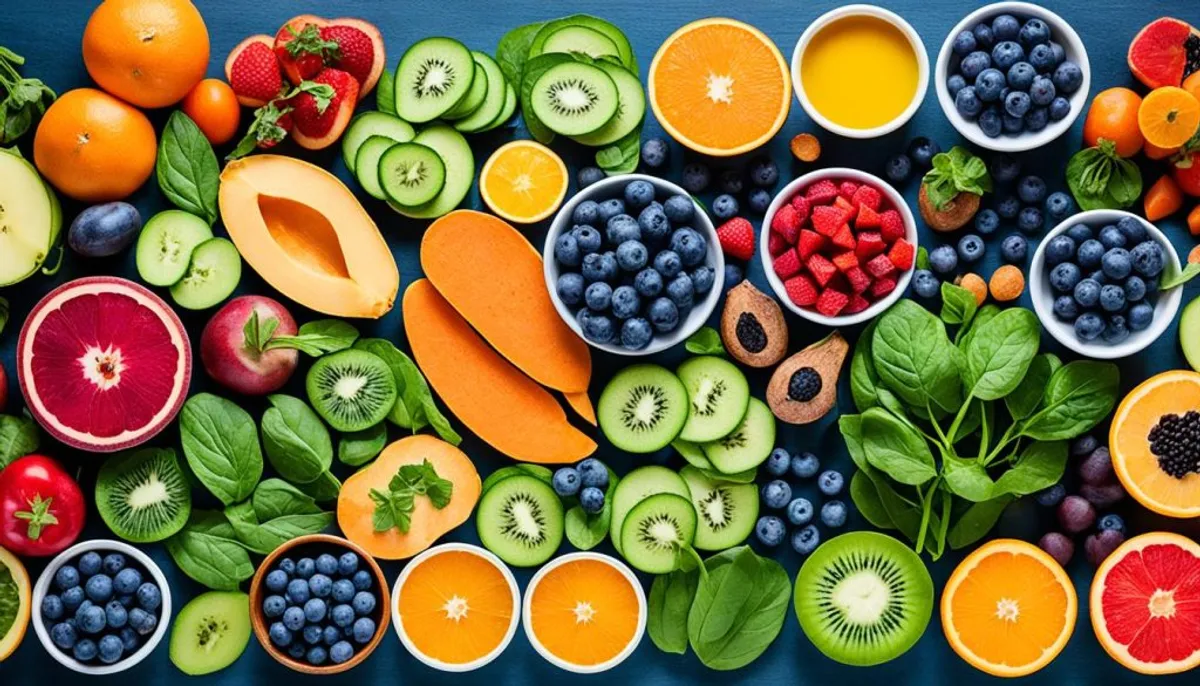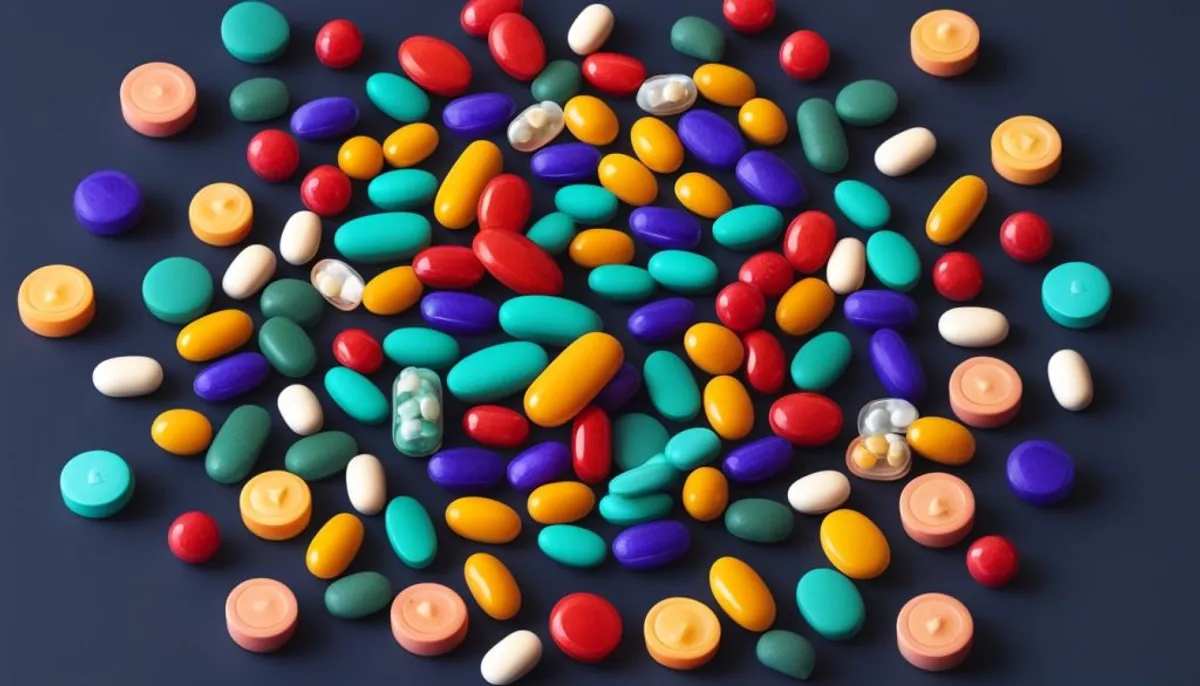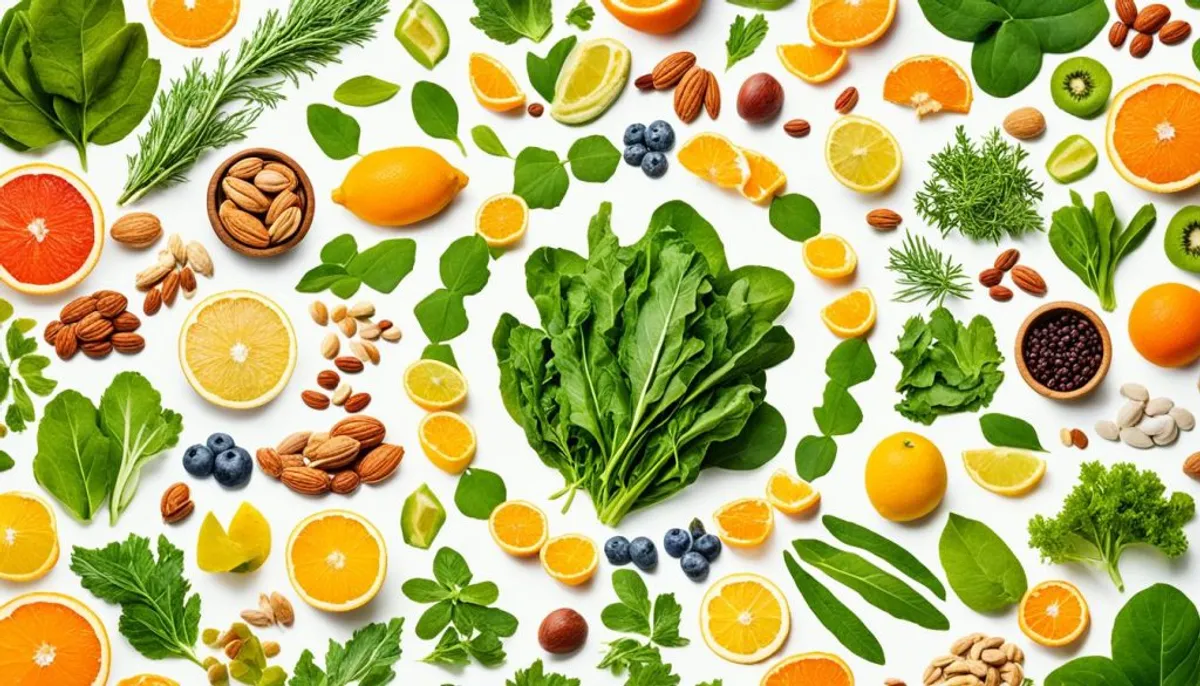Proper nutrition is key to healing wounds. Our bodies need more protein, zinc, and vitamins like vitamin C and D. These help repair bones and skin. Taking enough protein also helps strengthen muscles, which is important for physical therapy during recovery.
Wounds can be acute or chronic. Acute wounds come from injuries, while chronic wounds have many causes and take longer to heal. They can be slowed by inflammation and infection. The healing process has four stages: blood clotting, inflammation, new tissue growth, and maturation.

Knowing how nutrition affects wound healing is crucial for a good recovery. The right supplements boost collagen production and support the immune system. This can greatly improve the healing process.
The Importance of Proper Nutrition for Wound Healing
Getting your body to heal wounds well is key to feeling better. Eating right is a big part of this process. Knowing about acute and chronic wounds, and the healing stages, shows why a diet full of nutrients is important. It helps fix and grow new tissue.
Understanding Acute and Chronic Wounds
Acute wounds happen from things like cuts, burns, or surgery. They usually heal in a set order. Chronic wounds, however, come from issues like poor blood flow, diabetes, or other health problems. They heal much slower.
The Four Stages of Wound Healing
- Hemostasis: This first step is about stopping the bleeding and protecting the wound.
- Inflammation: The immune system kicks in to clean out damaged tissue and get ready for new growth.
- Proliferation: This stage is all about making new blood vessels, tissue, and skin cells to close the wound and rebuild.
- Maturation: The last stage is about making the new tissue strong and remodeling it, which leads to the wound healing fully.
It’s important to eat foods high in protein, zinc, and vitamins to help your body heal. These nutrients support healing at every stage. Eating well can make healing faster and stronger.
| Acute Wounds | Chronic Wounds |
|---|---|
| Caused by a specific injury, such as cuts, burns, or surgical procedures | Result from a combination of factors, such as poor circulation, diabetes, or underlying health conditions |
| Typically heal through a series of well-orchestrated phases | Can take significantly longer to heal |
Essential Vitamins for Accelerating Wound Recovery
Proper nutrition is key to healing wounds. Vitamin A, vitamin B complex, and vitamin C are vital for quick recovery.
Vitamin A: Boosting Collagen Production and Immune Function
Vitamin A, or retinol, is a key player in wound healing. It boosts the immune system to fight infections that slow healing. It also helps make collagen, a protein that gives skin strength and flexibility. This is important for closing wounds and forming scar tissue.
Vitamin B Complex: Supporting Cell Growth and Repair
The vitamin B complex includes eight vitamins that help wound healing in many ways. These vitamins help new cells grow and repair tissues. They also boost the immune system for better healing conditions.
Vitamin C: Synthesizing Collagen and Fighting Oxidative Stress
Vitamin C, or ascorbic acid, is crucial for wound healing. It makes collagen, which is important for skin structure. It also fights oxidative stress, which can slow healing.
Adding these vitamins to your diet or supplements can speed up wound healing. It helps your body recover naturally.

Micronutrients: The Crucial Role of Minerals in Wound Healing
Vitamins are key for healing wounds, but minerals like zinc, copper, iron, and selenium are also vital. These minerals help repair tissues, make collagen faster, and boost the immune system.
Zinc: Aiding Protein Synthesis and Immune Response
Zinc is key for healing wounds. It helps make new skin cells and fights infections. This is crucial for wounds to heal right.
Copper, Iron, and Selenium: Promoting Collagen Formation and Oxygen Transport
Copper is important for making connective tissue, blood vessels, and skin. Iron brings oxygen to the wound, helping it heal. Selenium protects cells from damage and infection, aiding healing.
| Mineral | Role in Wound Healing |
|---|---|
| Zinc | Protein synthesis, cell division, immune function |
| Copper | Connective tissue formation, blood vessel development, skin repair |
| Iron | Oxygen delivery to the wound site |
| Selenium | Antioxidant protection, infection prevention |
Getting enough of these minerals helps the body heal wounds faster and better.
What Supplements Promote Wound Healing
Proper nutrition is key to healing wounds. Getting nutrients from whole foods is best, but supplements can help fill gaps. Always talk to a healthcare provider before starting supplements, as they can affect medications.
Here are some top supplements for wound healing:
- Vitamin C: Vital for making collagen and boosting the immune system to fight off infection.
- Zinc: Helps make proteins, divide cells, and support the immune system, all important for healing.
- Arginine: This amino acid boosts blood flow, helps make collagen, and aids the healing process.
- Omega-3 fatty acids: These fats reduce swelling and help the healing process.
- Probiotics: Good gut health can help wound healing indirectly.
Remember, how well these supplements work and how much you need can vary. Always check with a healthcare professional before adding new supplements.

| Supplement | Benefits for Wound Healing |
|---|---|
| Vitamin C | Supports collagen production and immune function |
| Zinc | Aids in protein synthesis, cell division, and immune function |
| Arginine | Promotes blood flow, collagen formation, and inflammatory response |
| Omega-3 Fatty Acids | Reduce inflammation and support the overall healing process |
| Probiotics | Indirectly contribute to improved wound healing by supporting gut health |
Lifestyle Factors Impacting Wound Healing Process
Proper nutrition is key for wound healing, but our lifestyle also plays a big role. Factors like stress, lack of sleep, and smoking can slow down healing. They can make it harder for our bodies to recover.
Addressing Stress, Sleep Deprivation, and Smoking
Stress can really slow down wound healing. It can weaken our immune system and make healing take longer. To fight stress, try meditation, yoga, or relaxation exercises every day.
Lack of sleep also hurts wound healing. Our bodies fix and heal during sleep. It’s important to get enough good sleep for healing.
Smoking is bad for healing too. It cuts down blood flow, lowers oxygen, and makes it harder to fight infections. Quitting or cutting down on smoking can really help healing.
By working on these lifestyle habits, eating well, and taking supplements, we can help our wounds heal better and faster.
| Lifestyle Factor | Impact on Wound Healing | Recommended Approach |
|---|---|---|
| Stress | Impairs immune system, slows healing | Incorporate stress-management techniques |
| Sleep Deprivation | Disrupts restorative processes, affects inflammation | Ensure adequate, quality sleep |
| Smoking | Reduces blood flow, decreases oxygen, increases infection risk | Quit or reduce smoking habit |
Conclusion
The path to healing wounds is complex, but vitamins and minerals are key. They help with everything from blood clotting to growing new tissue. Eating a balanced diet, living healthily, and sometimes taking supplements can boost your body’s healing power.
Vitamins A, B, C, zinc, copper, iron, and selenium are vital for healing wounds. They each offer special benefits that speed up recovery and lower the chance of problems. Getting enough of these nutrients can make a big difference in how well you heal.
When trying to heal wounds, it’s smart to work with doctors to make a plan that fits your needs. A plan that looks at nutrition and lifestyle can help you heal better. This way, you can take charge of your healing and get back to full health.
Reduce your speed of aging, one scoop at a time with Green Zero
Green Zero is a daily core supplement for longevity inspired by the most complete longevity protocol. Bryan Johnson has spent millions of dollars to maximize his longevity. He made this shake to positively influence biological markers, from energy levels to metabolism to cellular regeneration.
RelatedRelated articles



